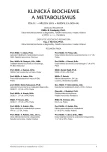-
Medical journals
- Career
Problems of measuring PTH in following chronic renal disease: A minireview.
Authors: J. Vávrová; B. Friedecký; L. Pavlíková
Authors‘ workplace: Ústav klinické biochemie a diagnostiky, Fakultní nemocnice, Hradec Králové
Published in: Klin. Biochem. Metab., 23 (44), 2015, No. 1, p. 5-8
Overview
Method:
Overview of recent literature on the PTH comparability from 2009-2014. Comparison of PTH results obtained from 99 patients on the hemodialysis during their regular controls. We used for this purpose three methods of 2nd generation (DiaSorin, Roche, Siemens DPC) and two methods of 3th generation (DiaSorin, Roche).Results and discussion:
Results obtained by different methods are not comparable. Median values are two times or more (in higher concentrations) different between results obtained by 2nd or 3th generation of methods. Differences between methods of the same generation are also significant. Number of patients on the hemodialysis with values in required interval of decision limits according to KDIGO 2009 was strongly dependent on the used method and maximum of these differences was approximately 250%. In our opinion is introducing the 3th generation methods of measurement PTH first step to improving the use of PTH in chronic renal diseased patients. Definitive step to rational use of PTH measurement is standardization.Keywords:
PTH, 2nd and 3th generation of methods, hemodialysis, comparability, standardization.
Sources
1. Cundy, T., Grey, A., Read, I. R. Calcium, phosphate and magnesium. In Marshall WJ, Bangert SK eds. Clinical biochemistry: molecular and clinical aspects. London 2nd Ed. Elesevier Sanders 2008).
2. KDIGO 2009. Clinical Practice Guideline for the Dia-gnosis, Evaluation, Prevention and Treatment of Chronic Kidney Disease-Mineral and Bone Disorder (CKD-MBD). Kidney International 2009, 76, S1-S2
3. KDIGO 2012. Clinical Practice Guideline for the Evaluation and Management of Chronic Kidney Disease. Kidney International supplements 2013, 3
4. Bruktorst, R. Mineral and bone disorder in chronic kidney disease-critical apprais of pharmacotherapy. Internist (Berl) 2014, 55: p. 334-339.
5. Souberbille, J. C., Cavalier, E., Jean, G. Interpretation on serum parathyroid hormone concentrations in dialysis patients: what do the KDIGO guidelines change for the clinical laboratory, Clin. Chem. Lab. Med. 2010, 48: p. 769-774.
6. Deckers, M. H., De Jongh, R. T., Lips, R. T., Penninx, B. W., Milaneschi, Y., Smit, J. H. et al. Prevalence of vitamin D deficiency and cosequences for PTH reference values. Clin. Chim. Acta 2013, 15, 426: p. 451-455.
7. Cavalier, E., Delanaye, P., Vracken, L., Bekaert, A. C., Carlisi, A., Chapelle, J. D. Interpretation of serum PTH concentrations with different kits in dialysis patients according to the KDIGO guidelines:importance of the re-ference (normal) values. Nephrol. Dial. Transplant. 2012, 27: p. 1950-1956
8. Hecking, M., Kainz, A., Bielesz, B., Plitschke, M., Beilhack, G., Horl, W. M. Clinical evaluation of two no-vel biointact PTH (1-84) assays in hemodialysis patients. Clin. Biochem. 2012. 45: p. 1645-1651.
9. O´Flaherty, D., Sankaralingam, A., Scully, P., Menghat, P., Goldsmith, D., Hampson, G. The relationship between intact PTH and biointact PTH (1-84) with bone and mineral metabolism in pre-dialysis chronic kidney disease (CKD). Clin. Biochem. 2013, 46: p. 1405-1409.
10. Tan, K., Ong, L., Sethi, S. K., Savo, S. Comparison of the Elecsys PTH (1-84) assay with four contemporary second generation intact PTH assays and assotiation with other biomarkers in chronic kidney disease patients. Clin. Biochem. 2013, 46: p. 781-786
11. Beko, G., Butz, H., Berta, K., Tisler, A., Olajos, F., Vasarhelyi, E., Pátocs, A. Switching between parat-hormone (PTH) assays:the impact on the diagnosis of renal osteodystrophy. Clin. Chem. Lab. Med. 2013, 51: p. 1251-1256.
12. Eddington, H., Hudson, J. F., Oliver, R. L., Fraser, W. D., Hutchison, A. J., Kaira, D. A. Variability in parathyroid hormon confounds clinical practice in chronic kidney disease patients, Ann. Clin. Biochem. 2014, 51: p.228-236.
13. Sturgeon. C. H., Sprague, S. H., Metcalfe, W. Variation in parathyroid hormone immunoassay results - a clinical governance issue in the management of chronic kidney disease. Nephrol. Dial. Transplant. 2011, 26: p. 3440-3445.
14. Cavalier, E., Delanaye, P., Lukas, P., Cortisi, A., Gadisseur, Souberbille, J. C. Standardization of DiaSorin and Roche automated third generation PTH assays with a international standard:impact on clinical population. Clin. Chem. Lab. Med. 2014, E pub
15. Couchman, L., Taylor, D. R., Krastins, B., Lopez, M. F., Moniz, C. F. LC-MS candidate reference methods for the harmonisation of parathyroid hormone (PTH) measurement:a rewiew of recent development and future considerations. Clin. Chem. Lab. Med. March 2014, E pub
Labels
Clinical biochemistry Nuclear medicine Nutritive therapist
Article was published inClinical Biochemistry and Metabolism

2015 Issue 1-
All articles in this issue
- Is science on the increase or fall?
- Problems of measuring PTH in following chronic renal disease: A minireview.
- Comparison of two most frequent methods for the determination of total bilirubin in newborns.
- State of standardization for determination of catalytic concentration of alkaline phosphatase as viewed by different programs of external quality control: Our view of the situation and its solution.
- Recommendation for laboratory screening of inborn defects in the first and second trimester of pregnancy
- The acute pancreatitis severity prediction using adiponectin, adipocyte fatty acid binding protein and fibroblast growth factor 21 levels in day 4 after admission
- Clinical Biochemistry and Metabolism
- Journal archive
- Current issue
- Online only
- About the journal
Most read in this issue- Comparison of two most frequent methods for the determination of total bilirubin in newborns.
- Problems of measuring PTH in following chronic renal disease: A minireview.
- Recommendation for laboratory screening of inborn defects in the first and second trimester of pregnancy
- State of standardization for determination of catalytic concentration of alkaline phosphatase as viewed by different programs of external quality control: Our view of the situation and its solution.
Login#ADS_BOTTOM_SCRIPTS#Forgotten passwordEnter the email address that you registered with. We will send you instructions on how to set a new password.
- Career

